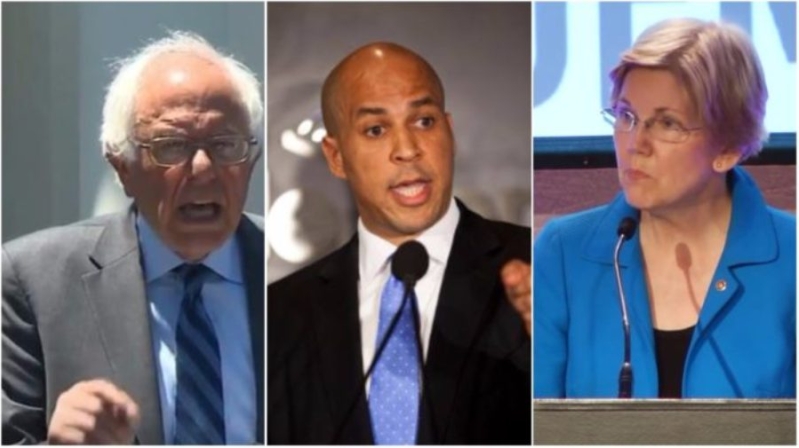
Bill (S.54) was introduced in the U.S. Senate on Thursday to prohibit creation of immigration-related registry programs that classify people based on religion, race, age, gender, ethnicity, national origin or nationality. The Protect American Families Act of 2017 was introduced by Sen. Cory Booker (D-NJ), in response to statements from then-candidate Donald Trump, indicating he would create a federal registry of Muslims, seek to deny Muslims entry to the United States, or otherwise add a religious test to American immigration procedures, if he became president.
The Act would prohibit the U.S. federal government from creating, or Congress from funding, any program that would have the effect of requiring people to "register or check in on the basis of religion, race, age, gender, ethnicity, national origin, nationality, or citizenship."
Booker wasjoined by Sens. Elizabeth Warren (D-MA), Brian Schatz (D-HI), Ed Markey (D-MA), Patty Murray (D-WA), Bernie Sanders (D-VT), Patrick Leahy (D-VT), Jeff Merkley (D-OR), and Mazie Hirono (D-HI) in introducing thislegislation.
"Religious freedom and freedom from discrimination are fundamental rights central to the very idea of being an American," Booker said.
"Forcing people to sign up for a registry based on their religion, race, or national origin does nothing to keep America secure. It does, however, undermine the freedom of religion guaranteed by our Constitution and promote the false notion that people of certain faiths and nationalities are inherently suspect. Our legislation would block Donald Trump and subsequent administrations from infringing on religious liberty by creating an immigration-related religious registry. Throughout our history, the United States has been a beacon of hope for those seeking religious freedom, and has taken significant steps forward to advance civil and human rights. We must ensure this legacy lasts forever into the future."
Last year, a bill introduced in the House (The Freedom of Religion Act), and supported by several religious liberty advocates including the Baptist Joint Committee, would have prohibited the government from discriminating on the basis of religion in determining who is allowed to enter the United States. That bill was referred to committee, but no action was taken.
"Targeting people based on their religion flies squarely in the face of who we are as Americans - and it makes our country less safe," Warren said. "This bill will uphold American values and ensure the federal government cannot engage in surveillance or harassment of certain immigrant groups."
"This bill reinforces the core American value that no person should be discriminated against based on their religion, origin, race, ethnicity, or nationality," Schatz said. "In Hawaii, one of the most diverse states in our country, we hold this belief as being central to our strength, resilience, and prosperity."
"It is contrary to everything we stand for as a country to target individuals simply because of their race, religion, ethnicity, age, or gender. The NSEERS program established in the aftermath of the September 11 attacks was a profound mistake. Not only was it proven to be completely ineffective, it was also rooted on a pernicious form of religious and ethnic profiling, rather than individualized suspicion. It was a program based on fear, rather than reason. Any program based on such a misguided premise has no place in this great country," Leahy said. "The Obama Administration was right to end the NSEERS program, and the legislation we introduce today ensures that no program like it will return."
"Contrary to the President-elect's beliefs, America's diversity is not a threat - it is, in fact, our greatest strength," Merkley said. "Opportunity for all is the American way and the secret to our nation's success. If our incoming President ever attempts to create a discriminatory database of Americans, let this be our warning shot: We will fight him every step of the way and in every way we can."
"The protection of our Constitution is not conditional; it applies to all of us," said Hirono. "We must take all steps possible to keep the incoming administration from using fear and prejudice to target the Muslim community, or any other faith or nationality. We will continue to fight for an inclusive and vibrant America."
President-Elect Donald Trump has repeatedly promised to establish a registry of individuals based on their religion.
National origin-based immigration registry systems have proven ineffective at combating terrorism and strengthening national security, but effective at instilling fear in certain communities, said Booker.
He points to the George W. Bush-era National Security Entry-Exit Registration System (NSEERS), which required non-citizen visa holders from certain countries to register with the federal government, registered 83,000-plus individuals from 24 Muslim-majority countries, but yielded zero terrorism convictions. "Yet, people tracked by NSEERS were required to register at local immigration offices, be fingerprinted, photographed, subjected to lengthy interrogations, and over 13,000 of whom were deported," he said.
The Obama administration announced in December it was repealing the regulatory framework for the NSEERS program.
The Protect American Families Act will help protect vulnerable communities from further marginalization, stigmatization and criminalization under profiling, asserted American-Arab Anti-Discrimination Committee members in a statement. "Our country is not made safer by using profiling as a policing method - profiling is ineffective and unreliable. People should not be judged by how they look, where they came from, or how they pray," the statement further declares.







